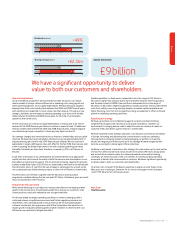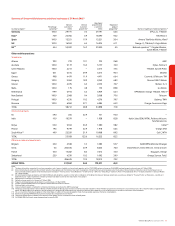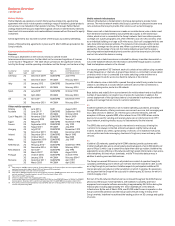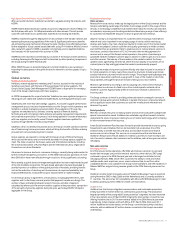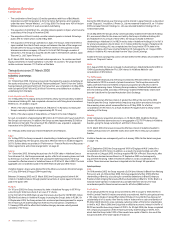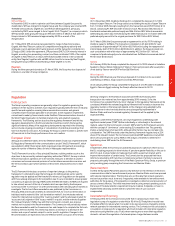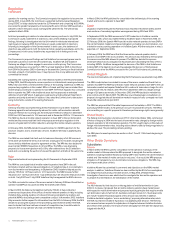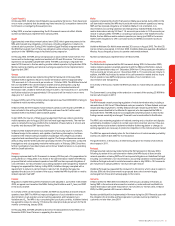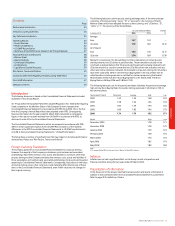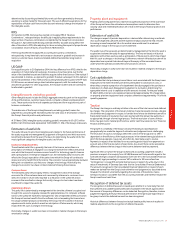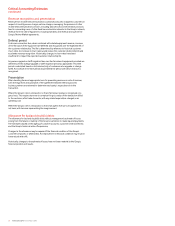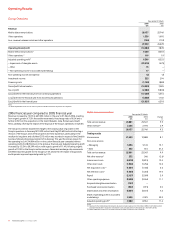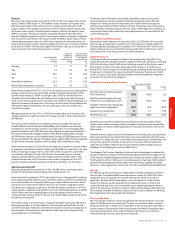Vodafone 2006 Annual Report Download - page 23
Download and view the complete annual report
Please find page 23 of the 2006 Vodafone annual report below. You can navigate through the pages in the report by either clicking on the pages listed below, or by using the keyword search tool below to find specific information within the annual report.
Vodafone Group Plc Annual Report 2006 21
Associates
SFR and Cegetel
In December 2003, in order to optimise cash flows between Cegetel Group and its
shareholders, SFR was merged into Cegetel Group and this company was renamed SFR.
The fixed line businesses, Cegetel S.A. and Télécom Développement, previously
controlled by SNCF, were merged to form Cegetel S.A.S. (“Cegetel”), a company in which
SFR had a 65% stake, giving the Group an effective interest of 28.5% at that date. The
Group’s interest in SFR remained at approximately 43.9% as a result of this
reorganisation.
On 11 May 2005, SFR announced an agreement to merge its fixed line business,
Cegetel, with Neuf Telecom, subject to competition and regulatory authority and
employee council approvals which were received, and the transaction completed, on
22 August 2005. Under the agreement, SFR purchased SNCF’s 35% minority interest in
Cegetel, according to a pre-existing contract, and then contributed 100% of the capital
of Cegetel to Neuf Telecom. In return, SFR received a 28% interest in the combined
entity, Neuf Cegetel, together with a 380 million bond to be issued by Neuf Cegetel,
bringing the Group’s effective shareholding in Neuf Cegetel to 12.4%.
Disposals
During the three year period ended on 31 March 2006, the Group has also disposed of
interests in a number of Group companies.
Japan
On 14 November 2003, Vodafone Holdings K.K. completed the disposal of its 100%
interest in Japan Telecom. The Group ceased consolidating the results of Japan Telecom
from 1 October 2003. Receipts resulting from this transaction were ¥257.9 billion (£1.4
billion), comprising ¥178.9 billion (£1.0 billion) of cash, ¥32.5 billion (£0.2 billion) of
transferable redeemable preferred equity and ¥46.5 billion (£0.2 billion) recoverable
withholding tax, which was received during the 2005 financial year. In October 2004, the
preferred equity was sold to the original purchaser for ¥33.9 billion (£0.2 billion).
On 17 March 2006, the Group announced an agreement to sell its 97.7% holding in
Vodafone Japan to SoftBank. The transaction completed on 27 April 2006 for cash
consideration of approximately ¥1.42 trillion (£6.9 billion) including the repayment of
intercompany debt of ¥0.16 trillion (£0.8 billion). In addition, the Group received non-
cash consideration with a fair value of approximately ¥0.23 trillion (£1.1 billion),
comprised of preferred equity and a subordinated loan. SoftBank also assumed debt of
¥0.13 trillion (£0.6 billion).
Sweden
On 5 January 2006, the Group completed the disposal of its 100% interest in Vodafone
Sweden to Telenor Mobile Holding AS (“Telenor”). Net cash proceeds after assumption
of net debt by Telenor were 970 million (£678 million).
Other disposals
During the 2004 financial year, the Group disposed of its interests in its associated
undertakings in Mexico, Grupo Iusacell, and India, RPG Cellular.
On 26 January 2005, the Group completed the disposal of a 16.9% stake in Vodafone
Egypt to Telecom Egypt, reducing the Group’s effective interest to 50.1%.
Business
Regulation
Introduction
The Group’s operating companies are generally subject to regulation governing the
operation of their business activities. Such regulation typically takes the form of industry
specific law and regulation covering telecommunications services and general
competition (anti-trust) law applicable to all activities. Some regulation implements
commitments made by Governments under the Basic Telecommunications Accord of
the World Trade Organisation to facilitate market entry and establish regulatory
frameworks. The following section describes the regulatory framework and the key
regulatory developments in the EU and selected countries in which the Group has
significant interests. Many of the regulatory developments reported in the following
section involve ongoing proceedings or consideration of potential proceedings that
have not reached a conclusion. Accordingly, the Group is unable to attach a specific level
of financial risk to the Group’s performance from such matters.
European Union
Although most Member States of the EU (“Member States”) have now implemented the
EU Regulatory Framework for the communications sector (“the EU Framework”), which
was adopted in 2002, there remain both ongoing and new infringement proceedings
against a number of Member States for late or inadequate implementation.
The EU Framework consists of four principal Directives outlining matters such as the
objectives to be pursued by national regulatory authorities (“NRAs”), the way in which
telecommunications operators are to be licensed, measures to be taken to protect
consumers and ensure universal provision of certain telecommunications services and
the terms and basis upon which operators interconnect and provide access to each
other.
The EU Framework introduces a number of important changes to the previous
framework. It is intended to align the techniques for defining where sector specific
regulation may be applied and the threshold for when such regulation can be applied
with those already employed in EU competition law. It is also intended to ensure greater
consistency of approach amongst NRAs within the Member States. All NRAs are required
to take utmost account of the list of markets which are specified by the European
Commission (the “Commission”) in a Recommendation when deciding which markets to
investigate. The first such Recommendation was published by the Commission in
February 2003 and includes markets at a wholesale level, for ‘voice call termination on
individual mobile networks’ (the “call termination market”), the ‘wholesale national
market for international roaming’ (the “roaming market”) and the wholesale market for
‘access and call origination’ (the “access market”) on public mobile networks (together
the “relevant markets”). NRAs may, with the Commission’s consent, also propose
markets not included in the Recommendation. The Commission will periodically review
the Recommendation and the Commission has said it expects to complete the first such
review by the end of 2006. This review may lead to an increase or a decrease in the
number and scope of markets subject to sector specific regulation. Changes to the
Recommendation are expected to become effective at the conclusion of the review,
while any changes to the framework would become effective following their
transposition into national law, from approximately 2010 onwards. So far, the
Commission has signalled that only minor changes to the regulatory framework will be
considered. Whether the reviewed regulatory framework will increase or decrease the
regulatory burden on the Group will depend on the changes being adopted by the
EU, the manner in which revised directives are subsequently implemented in
Member States and how the revised regulatory framework will be applied by the
respective NRAs.
Regulation, under the EU Framework, can only be applied to undertakings with
significant market power (“SMP”) (either individually or collectively) in the relevant
markets, subject to the Commission’s consent. SMP under the EU Framework accords
with the concept of “dominance” under existing EU competition law. This generally
implies a market share of at least 40%, although other factors may also be taken into
consideration. The SMP threshold under the previous framework required only a 25%
share of the relevant market. The Commission published SMP Guidelines in July 2002,
which set out principles for use by NRAs in the analysis of markets to determine if
undertakings have SMP under the EU Framework.
Spectrum
In September 2005, the Commission published proposals for spectrum reform across
the EU, including proposals to allow holders of spectrum greater flexibility on the use to
which it is put, to allow holders to trade spectrum within a spectrum market and to
improve harmonisation of certain bands. The Commission has proposed that these
reforms be enacted by 2010 and has commenced a number of actions to pursue its
proposals, principally through the work of the Radio Spectrum Policy Group, a spectrum
policy working group comprising the Commission and Member States.
Data retention
In 2005, the European Parliament passed a new Directive on the retention of electronic
communications data for law enforcement purposes. Member States must now proceed
with national implementation. The Directive sets out the data that network operators
and service providers must store and, if requested, make available to law enforcement
authorities for the purpose of the prevention, investigation, detection and prosecution of
serious criminal offences. The initial investment and recurring annual operating costs to
the Group of this data retention requirement may be material. It depends on how it is
implemented nationally and the extent to which the total of such costs are
compensated.
International Roaming
In February 2006, the Commission announced that it is proposing to enact new
legislation by way of a regulation under Article 95 of the EU Treaty (which would have
immediate effect) to reduce what it considers to be excessive prices charged by mobile
network operators for international roaming services. The Commission has concluded its
consultation on proposals for a regulation which will include both retail price regulation
aimed at ensuring that the costs of calls when roaming are no more than equivalent
domestic calls and the regulation of wholesale prices charged between mobile


